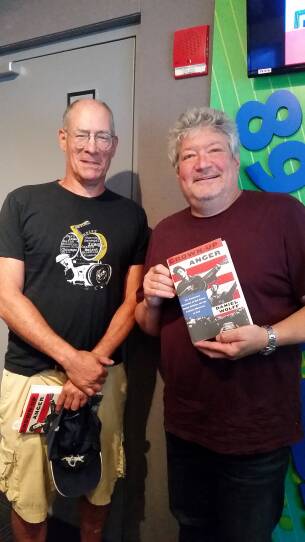WGBH's Henry Santoro interviewed Dan Wolff, author of "Grown Up Anger: The Connected Mysteries of Bob Dylan, Woody Guthrie and the Calumet Massacre of 1913." Below is a loosely edited transcription of their conversation. To listen to the entire interview, click on the audio player above.
HENRY SANTORO: When Writer Daniel Wolff was a young teenager listening to the radio, his life was changed when he heard Bob Dylan’s song “Like a Rolling Stone.” It had such an impact on him that he set out on a journey to find out who this guy Bob Dylan was. Well that journey led him to one of Bob Dylan's idols, Woody Guthrie, and it was Woody Guthrie who led Daniel Wolff to Guthrie’s song “1913 Massacre.” Now, all of this comes together in a fantastic new book called “Grown Up Anger” the connected mysteries of Bob Dylan, Woody Guthrie, and the Calumet Massacre of 1913. And it's my pleasure to welcome Daniel Wolff to WGBH’s Weekend Edition and to Henry in the Hub. Daniel, welcome.
DANIEL WOLFF: It's great to be here, great to be in Boston.
SANTORO: This book is right in my wheel house, and as a matter of fact, I'd be willing to bet that the majority of our listeners know exactly who Bob Dylan is, of course. They know Woody Guthrie, but not nearly as many people know the story of the Calumet massacre of 1913. So why don't we begin there and you tell us what happened.
WOLFF: Sure. First of all, how I got there was because Woody Guthrie wrote a song about it, right. You know, there's a sort of legend among the left about these events that are formative in the labor union and just in the history of the country, and I wondered what the actual facts were. So I started doing research. What happened, in 1913 there was a strike among the copper miners in the Upper Peninsula of Michigan, which is way north. And their hope was to get this strike settled in the summer, because winter in Upper Michigan is real. And if the company could hold out that long and block them, it wasn't likely they were going to make it. The snow started falling in September and October and, well the company did hold out, Calumet and Hecla, so that by December, when the song is set, they were pretty well defeated and they had a day before Christmas party to —
SANTORO: Bring their families together.
WOLFF: Exactly. At this event, somebody came in and shouted “fire.” Some portion of the crowd panicked. They tried to get out the one staircase out and 73 people died, the majority of them kids. And, you know, in a kind of macabre way, it sustained the strike for a little bit longer, but Guthrie heard about this, read about in a book — Guthrie was one at the time, you know, he wasn’t cognizant of it — and he was doing an LP that was sort of a documentary LP, a political LP about different issues and he picked this up and wrote, I think, a great song about it, called “1913 Massacre.”

SANTORO: Is it safe to say that had it not been for Woody Guthrie the Calumet massacre would have been long, long forgotten?
WOLFF: Not up there. Not in Upper Michigan.
SANTORO: It probably still resonates up there.
WOLFF: Oh yeah. It's still an issue up there, in fact. You know, I think the thing I didn't realize was how much it was still present. It's a lot of people to die in a little town, and in how much it had been repressed. So if I began trying to get to the facts of it, I realized that a lot of people weren't trying to get to the facts of it because it was too painful and they didn't want to talk about it. It sort of re-bolstered my faith in a certain line of history — what I call a line of anger in the book — that actually, there was something really wrong there, and that maybe as a 13-year-old, my pissed off-ness wasn't a bad instinct to have at the time.
SANTORO: Daniel Wolff is the author of “Grown Up Anger,” the connected mysteries of Bob Dylan, Woody Guthrie, and the Calumet massacre of 1913, a fantastic read. Daniel, thanks so much for coming in.
WOLFF: It's great to be here, Thanks.
SANTORO: I'm Henry in the Hub. This is WGBH’s Weekend Edition.






